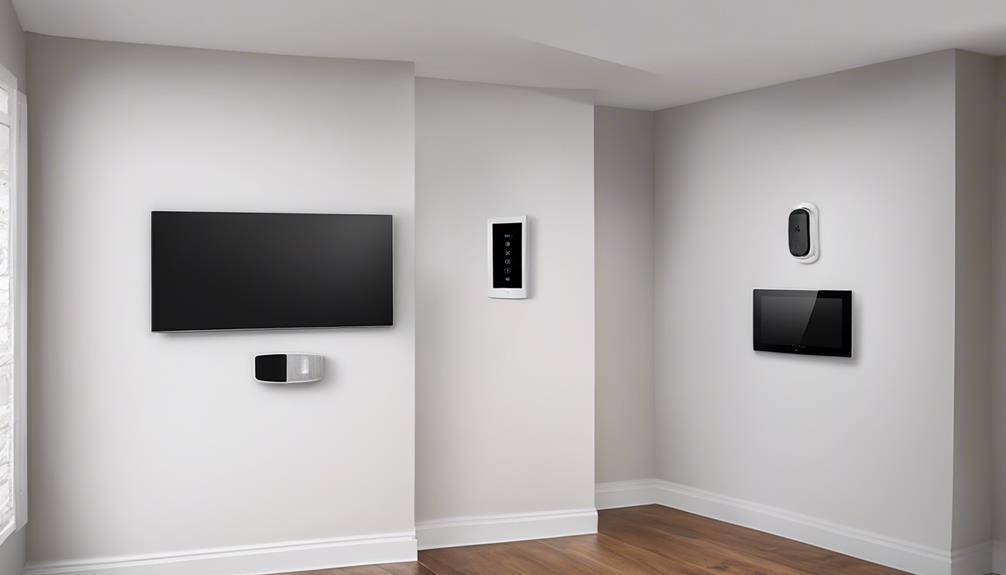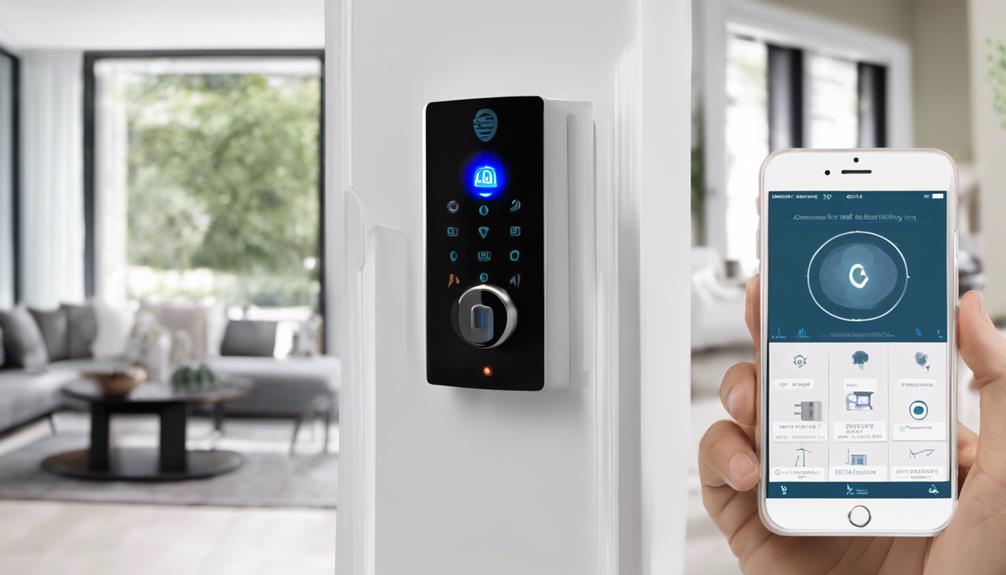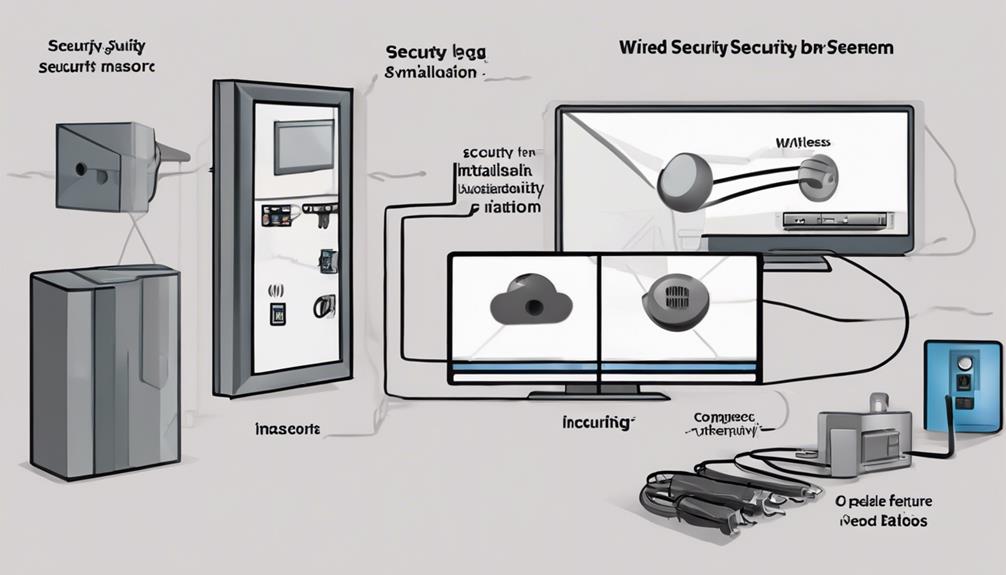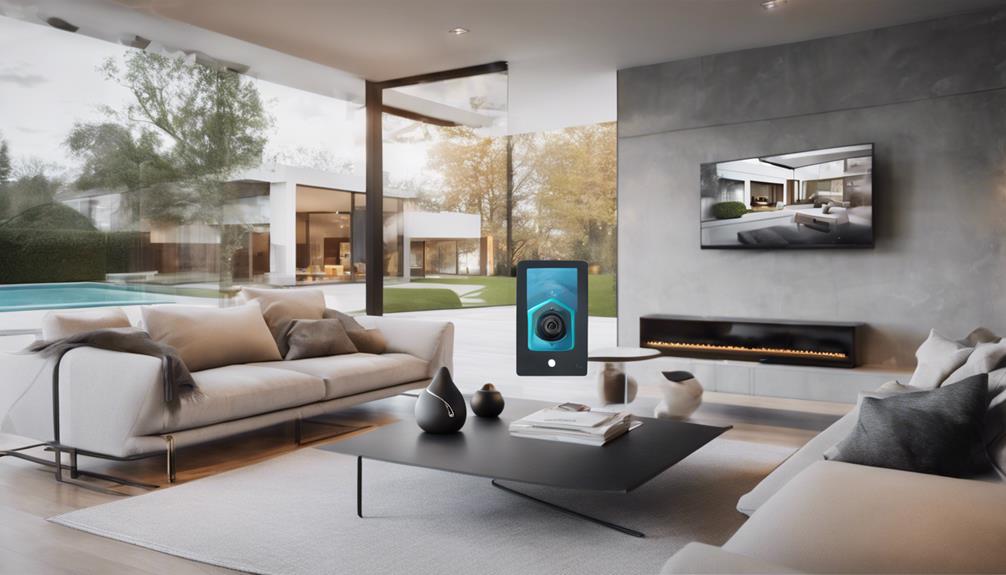When choosing between wired and wireless security systems, consider these factors: Wired systems boast stability and reliability with consistent monitoring, but wireless systems offer a quick installation process and flexible placement. Wired systems require periodic wiring checks, while wireless systems need regular battery replacements. Wired options allow advanced integrations while wireless systems may have limitations based on signal range. Initially, wired systems have a higher cost but lower long-term maintenance expenses, whereas wireless systems are cost-effective initially but may incur higher costs for battery replacements. Both systems have unique security features, so you can make an informed decision based on your specific needs.
Key Takeaways
- Wired systems offer stable connections and reliability, ideal for larger buildings.
- Wireless systems provide easy installation and flexibility but require regular battery replacements.
- Wired systems have higher initial costs but lower long-term maintenance expenses.
- Wireless systems offer advanced features like AI for proactive threat detection.
- Choose based on building type, scalability needs, and integration with smart home devices.
Wired vs. Wireless Security Systems

When it comes to choosing between wired and wireless security systems, you must consider the specific needs and requirements of your property. Wireless systems offer easy installation, saving you time and headaches. However, signal interference can sometimes cause false alarms or gaps in coverage, leading to potential security risks. On the other hand, wired systems provide a stable connection without worrying about signal disruptions, ensuring reliable monitoring. Yet, the installation time for wired systems can be longer due to the need for running cables through walls and ceilings. Ultimately, the decision between wired and wireless security systems depends on your priorities – whether you value convenience and quick setup or a robust, interference-free signal for maximum protection.
Installation Process Differences
Considering the differences between wired and wireless security systems, the installation process stands out as a critical factor influencing your decision. When it comes to installation challenges, wired systems may require drilling holes for cables, which can be a headache. On the other hand, wireless systems offer a simpler setup without the need for extensive wiring. Installation time is another key difference: wired systems usually take longer due to cable routing and connections, whereas wireless systems can be up and running in no time. To give you a clearer picture, here are some contrasting installation process differences:
- Wired Systems:
- Complex cable routing
- Longer installation time
- Wired systems provide reliable connections enhancing video surveillance reliability.
- Wireless Systems:
- No drilling needed
- Quick setup and activation
Reliability and Stability Comparison

For those prioritizing reliability and stability in their security system, understanding the distinctions between wired and wireless options is essential. Wired systems tend to be more reliable since they are not susceptible to signal interference like their wireless counterparts. Environmental factors such as thick walls or electronic devices can sometimes disrupt wireless signals, leading to potential security gaps. However, wired systems are not without their own challenges; they can be affected by power outages, requiring battery backups to maintain functionality. When it comes to stability, wired systems are generally seen as the more robust choice. So, if you want a security system that can weather any storm, both literally and figuratively, a wired system might be the way to go.
Maintenance and Upkeep Requirements
When considering maintenance and upkeep requirements for security systems, it is essential to evaluate the needs of wiring maintenance and the frequency of battery replacements. Wired systems may require periodic checks and potential repairs of the physical wiring to guarantee consistent functionality. In contrast, wireless systems often necessitate regular battery replacements to maintain peak performance and reliability. These factors play a significant role in the long-term maintenance costs and overall operational efficiency of the security system you choose. Additionally, understanding the advantages and disadvantages of wired and wireless systems can help in making an informed decision based on your specific needs and preferences.
Wiring Maintenance Needs
To guarantee the ideal functioning of your wired security system, it is vital to stay vigilant about the maintenance and upkeep of the wiring components. Keeping the wiring in top shape guarantees your system operates smoothly without any hiccups. Here are some wiring maintenance needs to take into account:
- Regularly inspect wiring materials for any signs of wear and tear.
- Securely fasten all wiring to prevent accidental disconnections.
- Keep the wiring tidy and organized to avoid potential tangling or confusion.
- Conduct periodic checks to confirm there are no pests or critters nibbling on your wires – they might mistake them for a midnight snack! It is also important to be aware of installation challenges that can impact the reliability of wired security systems.
Battery Replacement Frequency
Ensuring the proper maintenance and upkeep of your security system involves a critical aspect: the frequency of battery replacements. In the domain of battery life and power management, wireless security systems often require more frequent battery changes compared to their wired counterparts. This is because wireless systems rely solely on battery power, whereas wired systems draw power continuously from your home's electrical supply. While wireless systems offer flexibility in installation, they demand vigilant monitoring of battery levels to prevent power outages. Proper power management is key to ensuring uninterrupted security coverage. So, if you opt for a wireless system, remember to stay on top of those battery replacements to keep your security fortress fully armed and operational! Additionally, the reduced false alarms in wired systems contribute to a more efficient monitoring process, enhancing the overall reliability of your home security solution.
Customization Options Available

When considering security system options, understanding the customization flexibility benefits is essential. By being able to select tailored features and personalize system configurations, you can guarantee your security setup aligns perfectly with your needs. This level of customization allows for a more efficient and effective security solution tailored to your specific requirements. Additionally, the ability to choose between wired and wireless systems offers different levels of connection stability and network security, providing options to cater to various preferences and priorities.
Customization Flexibility Benefits
With wired security systems, you have unparalleled customization flexibility benefits at your fingertips. Here's why wired systems offer the ultimate customization options:
- Advanced Integrations: Seamlessly connect your security system with other smart home devices.
- User Preferences: Tailor settings to match your specific needs and preferences.
- Expandability: Easily add more sensors or cameras without worrying about signal interference.
- Custom Alerts: Set up personalized alerts for different scenarios, like receiving a notification if a window is left open.
Wired systems give you the power to fine-tune every aspect of your security setup, ensuring it fits your lifestyle like a glove.
Tailored Features Selection
To further enhance your security setup, the tailored features selection aspect provides a range of customization options tailored to your specific needs and preferences. When considering feature prioritization, take into account your user preferences to create a personalized security system that suits you best. Whether you value remote access, motion detection, or integration with smart home devices, the tailored features selection allows you to fine-tune your security system to meet your unique requirements. By customizing your security system based on your preferences, you can guarantee that it aligns perfectly with your lifestyle and provides the level of protection you desire. So, don't hesitate to explore the various options available and tailor your security system to cater to your individual needs with precision and style.
Personalized System Configurations
For a security system that caters precisely to your needs, exploring personalized system configurations is essential. When it comes to system integration and user preferences, the possibilities are endless. Consider the following options to tailor your security setup:
- Customized Sensor Placements: Strategically place sensors based on your home layout and potential entry points.
- Smart Device Integration: Connect your security system to your smart devices for seamless control and monitoring.
- User-Friendly Interface: Customize your system's interface to suit your preferences and make navigation a breeze.
- Personalized Alerts: Set up alerts that align with your schedule and lifestyle for the most effective security monitoring.
With personalized configurations, your security system will not only meet but exceed your expectations.
Cost Analysis for Both Systems
When evaluating the cost analysis between wired and wireless security systems, it is essential to explore the specifics of each system to make an informed decision based on your needs. Wired systems typically require a higher initial investment due to the cost of cables, installation, and labor. However, in the long term, maintenance costs are generally lower as there are no batteries to replace. On the other hand, wireless systems offer a more cost-effective initial setup since they do not require extensive wiring. Yet, over time, battery replacements and potential signal interferences may lead to higher long-term costs. So, if you're looking to save some cash upfront, wireless might be the way to go, but be prepared for potential long-term expenses sneaking up on you. Additionally, it's important to evaluate the environmental factors like weather that can affect the performance and costs of wireless security systems.
Security Features and Effectiveness

Moving beyond the cost analysis of wired and wireless security systems, let's now focus on the security features and effectiveness offered by these systems. When it comes to security features and effectiveness, here's what you need to evaluate:
- Advanced Monitoring: Wireless systems often come with advanced monitoring features like real-time alerts and mobile notifications, keeping you updated on any security breaches. AI enhances proactive threat detection in smart homes, providing an added layer of security with accurate security alerts.
- User Accessibility: Wireless systems usually offer easier user accessibility through smartphone apps, allowing you to control your security system remotely.
- Integration Capabilities: Both wired and wireless systems can integrate with other smart home devices, enhancing overall security.
- Reliability: While wired systems are known for their reliability, wireless systems have improved markedly in this aspect, offering robust security solutions.
Building Type Considerations
Considering the layout and structure of your building is essential when selecting between wired and wireless security systems. The building layout plays a vital role in determining the most suitable system for your security needs. For complex layouts with multiple floors and hard-to-reach areas, wireless systems offer flexibility without the need for extensive wiring. On the other hand, wired systems are often preferred for larger buildings where signal interference could be an issue. Assess your security needs carefully to determine which system aligns best with your building type. Remember, the right choice can make a significant impact on the effectiveness of your security measures, so choose wisely based on your building's unique characteristics.
Conclusion and Recommendations

Given the importance of selecting the right security system based on your building type, it is essential to now draw conclusions and offer recommendations to guarantee ideal security measures. When considering wired vs. wireless security systems, remember that user preferences and future trends play a vital role. Here are some key takeaways to help you make an informed decision:
- Consider scalability: Make sure the system can adapt to future expansions.
- Evaluate maintenance needs: Factor in the upkeep required for each system type.
- Assess flexibility: Determine which system aligns better with your changing security needs.
- Think about integration: Look into how easily the security system can integrate with other smart home devices for added convenience and safety.
Conclusion
Based on the comparison of wired and wireless security systems, you should consider your specific needs and preferences before making a decision. While wired systems offer reliability akin to a sturdy fortress, wireless systems provide the flexibility of a nimble warrior. Whether you prioritize stability or convenience, understanding the differences between the two can help you choose the security system that best suits your unique requirements. Choose wisely, for your safety and peace of mind depend on it.









